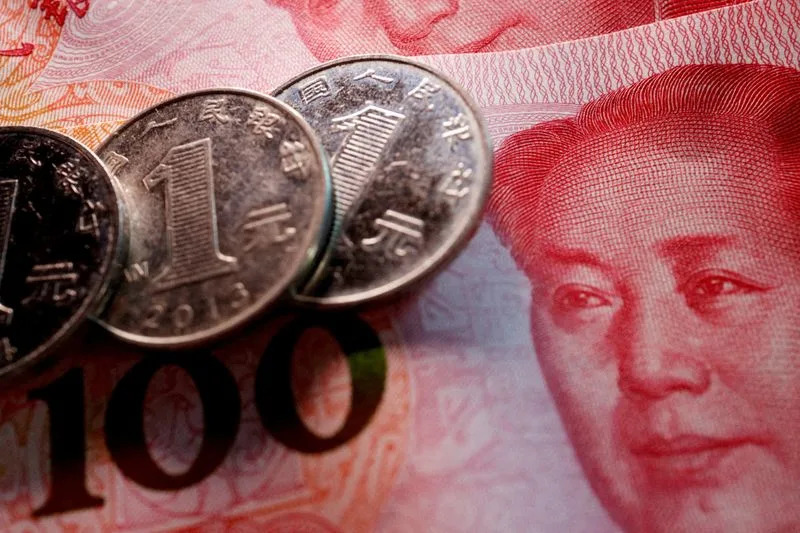Caleb Naysmith
Thu, August 31, 2023

The Chinese real estate market is experiencing another potential black swan event as Country Garden, once China's largest property developer by sales, spirals into a crisis that threatens to surpass the impact of China Evergrande Group.
The Foshan-based Country Garden is under heightened scrutiny because it oversees four times as many property projects as Evergrande. China's housing slump is exacerbating broader concerns over its economy, with signs of spillover effects ranging from missed payments by major shadow banks to a bond sell-off among Hong Kong property developers.
While the U.S. Market has seen turmoil, many markets are on the rebound. S&P 500 is up over 18% year-to-date, and the housing market continues to climb despite rising interest rates. The retail startup investing market continues to do well, with platforms like StartEngine having nearly $100 million invested in their platform this year alone, including over $17.5 million invested in their ongoing raise.
Liquidity Crisis And Missed Payments
Country Garden revealed that it is in ongoing negotiations with bond investors and banking institutions to extend maturities and secure its financial position. The company has already missed interest payments on some dollar bonds. Significant dates are fast approaching, including a yuan bondholders' vote this week on extending the payment deadline of a bond due Sept. 4. Additionally, the company must navigate the end of grace periods for a combined $22.5 million in dollar-note coupons by early September.
Financial Strains And Asset Devaluation
The situation is particularly alarming as Country Garden's bonds are trading at deeply distressed levels. A $1 billion note set to mature in January is currently trading at less than 13 cents on the dollar. The company has also seen its stock plunge by 67% this year, relegating it to penny stock status. Despite a 39% increase in revenue, the company posted a net loss of 48.9 billion yuan ($6.72 billion) for the first half of 2023, compared to a profit of 612 million yuan a year earlier.
Country Garden revealed that it is in ongoing negotiations with bond investors and banking institutions to extend maturities and secure its financial position. The company has already missed interest payments on some dollar bonds. Significant dates are fast approaching, including a yuan bondholders' vote this week on extending the payment deadline of a bond due Sept. 4. Additionally, the company must navigate the end of grace periods for a combined $22.5 million in dollar-note coupons by early September.
Financial Strains And Asset Devaluation
The situation is particularly alarming as Country Garden's bonds are trading at deeply distressed levels. A $1 billion note set to mature in January is currently trading at less than 13 cents on the dollar. The company has also seen its stock plunge by 67% this year, relegating it to penny stock status. Despite a 39% increase in revenue, the company posted a net loss of 48.9 billion yuan ($6.72 billion) for the first half of 2023, compared to a profit of 612 million yuan a year earlier.
Lack Of Proactive Measures
In a recent filing, Country Garden admitted to a lack of timely action to counteract the market slowdown. It also confessed to underestimating the risks associated with its heavy focus on lower-tier property markets.
"The profundity and persistence of the market's downtrend still caught the company off guard," the filing stated.
Key financial figures:
Revenue rose by 39.4% to 226.3 billion yuan.
Core net loss was 45.3 billion yuan, in stark contrast to a core net profit of 4.9 billion yuan last year.
Total debts shrank slightly to about 257.9 billion yuan, but roughly 108 billion yuan is due within the next 12 months.
Cash balance dwindled to 130.6 billion yuan, including 29.5 billion yuan in restricted form.
What's Next For The Chinese Economy?
The property slump in China has taken another hit with new home sales declining the most in the past year as of July. Despite a recent easing in mortgage policies by the central government, analysts remain skeptical that these measures will be sufficient to arrest the economic decline. China's major banks are also reportedly preparing to slash interest rates on existing mortgages and deposits to boost growth.
The unfolding crisis at Country Garden adds another layer of urgency to China's economic challenges and raises new questions about the stability of the global economy. The consequences of a potential collapse would be far-reaching, impacting not just the real estate sector but also financial markets and economic growth both within China and globally.
China ramps up economic support as Country Garden vote looms


Thu, August 31, 2023
By Ziyi Tang, Clare Jim and Xie Yu
BEIJING/HONG KONG (Reuters) -China stepped up measures to boost the country's faltering economy on Friday, with top banks paving the way for further cuts in lending rates and sources saying Beijing plans further action including relaxing home-purchase restrictions.
As part of those measures, the authorities also cut the amount of funds institutions need to hold in foreign exchange reserves. The measures cheered investors, and analysts said they should prevent a further downturn in the ailing property sector.
China is grappling with a slowdown that has rattled global markets, with the spotlight now firmly focused on troubled developer Country Garden's spiralling debt crisis in a sector that contributes to roughly a quarter of the economy.
As pressure mounts, the authorities have rolled out a series of measures to spur the economy and revive the property market, with steps including the easing of some borrowing rules and a cut to the amount of forex banks must hold as reserves.
The country is set to take further action including relaxing home-purchase restrictions, four people familiar with the matter said.
Regulators including the housing ministry, central bank and financial regulator in coming weeks will implement measures they have been working on over the past few months under State Council guidance, two of the people said.
ANZ's senior China economist Betty Wang said several nation-wide property easing measures in the past couple of weeks have exceeded market expectations.
"This is the first time since 2021 that China has announced a series of nationwide property easing measures. They will help restore market confidence and prevent the sector from declining further."
COUNTRY GARDEN TEST
In the near term, however, market sentiment will be swayed by the outcome of a crucial test of investor confidence in Country Garden.
On Thursday, Country Garden delayed a deadline for creditors to vote on whether to postpone payments for an onshore 3.9 billion yuan ($537 million) private bond until Friday 1400GMT to give bondholders "sufficient time" to prepare for the vote.
Ahead of the voting result on Friday, some onshore creditors of that private Country Garden bond received interest payments, sources with direct knowledge of the matter said. They declined to be named as they were not authorised to speak to the media.
Country Garden declined to comment.
Friday's vote is a key hurdle Country Garden faces as it strives to avoid default, with one holder of the developer's dollar bonds saying if the company cannot extend its domestic debt, it will be unable to service external bondholders.
"This has been a slow-moving car crash," said the bondholder, who declined to be identified due to the sensitivity of the issue, adding that concerns centred around uncertainty over the broader economy and tensions with Washington.
"Everything they do right now is going to have an impact five to 10 years down the line."
Country Garden, China's largest private developer by sales, did not immediately respond to Reuters request for comment.
Stress in the property market has intensified pressure on Beijing to implement supporting measures and fanned concern about the ability of policymakers to arrest a decline in China's broader economic growth.
China's new home prices fell for the fourth month in August, according to a private survey on Friday, as the property debt crisis kept confidence at a low ebb despite the string of support measures.
DEPOSIT RATES CUT
The central bank said on Friday it would cut the foreign exchange reserve requirement ratio (RRR) by 200 basis points (bps) to 4% from 6% beginning Sept. 15, a move seen aimed at slowing the pace of yuan declines.
The lenders lowering mortgage rates on Friday included Industrial and Commercial Bank of China, China Construction Bank Corp and Agricultural Bank of China, which cut their deposit rates by between five and 25 basis points, websites from each bank showed. Several midsized banks also announced they will start cutting interest rates on a range of deposits by 10-25 basis points.
The measures helped lift confidence in the market and battered property stocks rallied, with China's CSI 300 Real Estate Index ending up 2.4%, while the blue-chip CSI300 Index climbed 0.5%.
Three sources familiar with the matter told Reuters on Tuesday that major state banks would cut deposit rates as they prepare to lower interest rates on existing mortgages soon.
Starting from Sept. 25, first-time home buyers with mortgages can apply to their banks for a lower interest rate on their existing loans, China's central bank and financial regulator announced on Thursday.
The deposit rate cuts are the third such cuts within a year, with the scale of cuts bigger than previous rounds in June and in September last year.
Lower deposit rates will partially offset various pressures on banks' narrowing net interest margins - a key gauge of profitability, said Nicholas Zhu, a banking analyst at Moody's.
"The impact of the deposit rate cut is material, given that close to three-quarters of Chinese banks' liabilities are deposits," Zhu said.
China's mortgage loans totalled 38.6 trillion yuan ($5.29 trillion) at the end of June, representing 17% of banks' total loan books.
Meanwhile, Beijing and Shanghai on Friday announced that they would allow home buyers to enjoy preferential loans for first-home purchases regardless of their previous credit records.
With this, all of China's first-tier cities have broadened the definition of first-home mortgages, in a bid to boost buyer sentiment.
($1 = 7.2633 Chinese yuan renminbi)
(Reporting by Ziyi Tang, Ryan Woo and Wang Jing, additional reporting by Davide Barbuscia in New York; Writing by Sumeet Chatterjee; Editing by Anne Marie Roantree, Lincoln Feast and Susan Fenton)

No comments:
Post a Comment